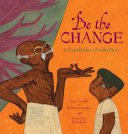2018 School Spending Survey Report
Be the Change: A Grandfather Gandhi Story
GANDHI, Arun & . illus. by Evan Turk. 48p. ebook available. S. & S./Atheneum. Aug. 2016. Tr $18.99. ISBN 9781481442657.
COPY ISBN
 Gr 2–6—Following Grandfather Gandhi, this title finds young Arun at his grandfather's ashram, or "service village." Slightly older now, the boy is working to adhere to the 11 vows of ashram living. Not wasting is the most difficult for him, and he has trouble understanding how this vow relates to nonviolence. Three incidents combine to help Arun learn the lesson. He accompanies his grandfather (Bapuji) on a trip and listens as he tells a crowd, "When nonviolence is accepted as the law of life, it must pervade the whole being and not be applied to isolated acts." On the way home, Arun tosses away a pencil stub. When Bapuji finds out, he sends Arun back in the dark to retrieve it, saying, "It is not the pencil, but you, that is important," meaning that Arun's grandfather loves him enough to hold him accountable. The third way that Grandfather teaches Arun is by helping him make a "tree of violence," a chart on the wall that shows how seemingly small actions or thoughts can lead to larger events. The illustrations, especially the visualization of Arun's tree, help children understand the weighty concepts. As he adds to it each day, it grows beyond the physical walls, dwarfing Bapuji and Arun and demonstrating that each decision takes a person on a particular path. The dramatic collage illustrations include dimensional elements to create the illusion of texture. The full-bleed spreads immerse readers and take them on the journey with Arun. Constantly shifting perspective moves from small to large and close to far, reiterating the theme of a small action having larger consequences. Another repeated motif is the use of frames within larger images to demonstrate connectedness.
Gr 2–6—Following Grandfather Gandhi, this title finds young Arun at his grandfather's ashram, or "service village." Slightly older now, the boy is working to adhere to the 11 vows of ashram living. Not wasting is the most difficult for him, and he has trouble understanding how this vow relates to nonviolence. Three incidents combine to help Arun learn the lesson. He accompanies his grandfather (Bapuji) on a trip and listens as he tells a crowd, "When nonviolence is accepted as the law of life, it must pervade the whole being and not be applied to isolated acts." On the way home, Arun tosses away a pencil stub. When Bapuji finds out, he sends Arun back in the dark to retrieve it, saying, "It is not the pencil, but you, that is important," meaning that Arun's grandfather loves him enough to hold him accountable. The third way that Grandfather teaches Arun is by helping him make a "tree of violence," a chart on the wall that shows how seemingly small actions or thoughts can lead to larger events. The illustrations, especially the visualization of Arun's tree, help children understand the weighty concepts. As he adds to it each day, it grows beyond the physical walls, dwarfing Bapuji and Arun and demonstrating that each decision takes a person on a particular path. The dramatic collage illustrations include dimensional elements to create the illusion of texture. The full-bleed spreads immerse readers and take them on the journey with Arun. Constantly shifting perspective moves from small to large and close to far, reiterating the theme of a small action having larger consequences. Another repeated motif is the use of frames within larger images to demonstrate connectedness.
VERDICT This handsome book asks a lot of young readers but carries important messages delivered in a personal and relatable manner.
ALREADY A SUBSCRIBER? LOG IN
We are currently offering this content for free. Sign up now to activate your personal profile, where you can save articles for future viewing





Be the first reader to comment.
Comment Policy:
Comment should not be empty !!!